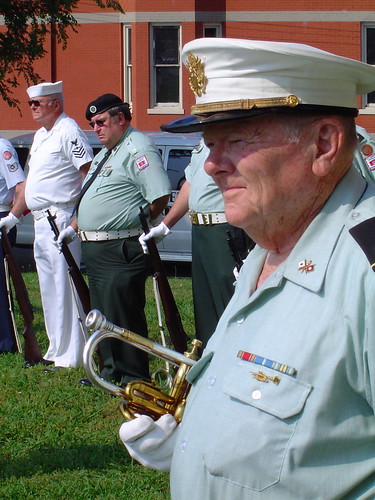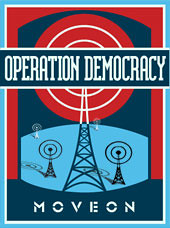Heroes In Wars not of Their Making

Yesterday was Memorial Day, and I actually did something to commemorate our lost servicemen and women. My daughter Chloe and I went to the Memorial Day Ceremonies here in Knoxville, sponsored by the American Legion. There was a short program that included comments from a veteran and an active duty marine, and ended with a rifle salute and taps. It was a moving experience and I’m glad I went.
It’s important to support the troops as we speak and act in opposition to the Bush administration policy in Iraq. It’s important because military personnel act under orders. They don’t get to choose whether a war is just or a strategy is wise. No matter what the situation or the consequences or the risk, our active duty military, reserves, guard, and veterans put their lives on the line.
Yesterday I also did some online reading. I read the tragic story of the fall of Saigon at the end of the Vietnam War. In the spring of 1975, American-supported South Vietnam was falling to Communist forces from the north. Panic reigned in the streets of Saigon. The city was surrounded and the only hope for escape lay with the American military. The brass in Washington had waited too long to begin the evacuation, so that soldiers were faced with thousands of Vietnamese at the airport and embassy begging to be taken along.
When the evacuation finally began, Americans and Vietnamese friendlies were to be plucked out of the chaotic and violent city by helicopter and carried to waiting ships. Master Sergeant John J. Valdez was the Staff Non Commission Officer in charge at the American Embassy, and was on the last chopper out of Vietnam. Marines secured the U.S. Embassy against surging, desperate crowds. They followed orders to let in some and keep out others. When they finally had to bar the gate and retreat inside the building, desperate crowds drove a truck through the gate and eventually overran all but the embassy roof. Valdez and his Marines maintained order in chaos, and saw to it that hundreds of personnel made it out that night on waves of helicopters.
The choppers stopped coming with only Valdez and ten of his men left on the roof in the middle of the night and shooting below. When the last few choppers finally came, Valdez and his men flew out of a city in despair. The term “hero” is usually reserved for victorious armies, and the Americans withdrew in defeat. But decades later, Valdez writes in his first-hand account,
“The men were great, and I’m not exaggerating. These kids were really good. They responded to all my commands. Considering how many young, new troops I had, they all worked as a unit. The kids were great ....I should say, the Marines were great.”A more hopeful example of heroism and American foreign policy is the D-Day invasion of France in 1944. In another example of true heroism, 73,000 American soldiers as well as 83,115 British and Canadians followed orders to hit the beaches at D-Day. By the end of that single day of fighting, around 2500 were dead. Yet without the sacrifice of those soldiers Europe would probably have fallen to one of the most evil regimes of the twentieth century. The soldiers who hit the beach had no choice in the matter. The artillery exploded, the boats got as close as they could, the machine guns chattered, and Americans died in the surf and on the beach on the way to winning a war.
On the beaches of Normandy, soldiers charged out of waterlogged metal boxes into deadly gunfire that cut them to pieces. Many landing craft sank in rough seas. Others jumped off the boats in deep water and had to struggle out of heavy packs to keep from drowning. Once on the beach they faced cliffs in some places, razor wire in others, and wide low-tide beaches with hellish noise and smoke everywhere. Deadly accurate gun emplacements in concrete bunkers. had been preset into deadly patterns the Americans walked into. The wounded and dead were everywhere. Soldiers washed up onshore and corpses lay half-buried in the sand.
American Sergeant Leonard Lomell was part of a ranger company assigned to knock out some big guns and set up a roadblock along a coastal road. In his first-hand account, he tells how they lost a third of their men when their boat sank. Lomell was shot as soon as the gate dropped on his landing craft. Despite a flesh wound in the side, Lowell struggled acted as platoon leader. His men climbed a rope up a cliff, fought the enemy crater-to-crater, made it to the road, blew up telephone lines, evaded a large armored German force, and destroyed an artillery emplacement that arial reconnaissance had missed. For his heroism that day, Lomell received the Distinguished Service Cross.
The difference between these two stories is in the policies and strategies, not in the bravery of our soldiers. One incident signaled defeat while the other lead to victory, but individual bravery has nothing to do with victory. In fact it is discipline in the face of overwhelming risk that constitutes bravery.
As we continue to struggle with a present-day war in Iraq, let’s always remember that bad policy does not make a bad soldier. On the contrary, it is under these circumstances that true heroism shines.



0 Comments:
Post a Comment
<< Home